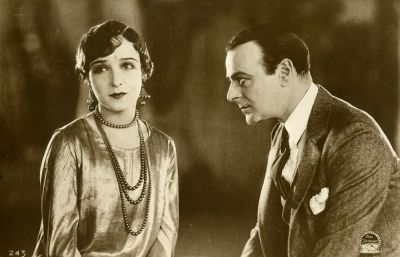
YOU NEVER KNOW WOMEN
(Maschere russe, USA/1926)
R.: William Wellman. D.: 71'. Did. inglesi
T. it.: Maschere russe. Sog.: Ernest Vajda. Scen.: Benjamin Glazer. F.: Victor Milner. Int.: Florence Vidor (Vera), Lowell Sherman (Eugene Foster), Clive Brook (Norodin), El Brendel (Toberchik), Roy Stewart (Dimitri), Joe Bonomo (il forzuto), Irma Kornelia (Olga), Sidney Bracey (manager). Prod.: Adolph Zukor, Jesse L. Lasky per Famous Players Lasky Corp.
35mm. D.: 71'. Bn. Didascalie inglesi / English intertitles
Da: Library of Congress per concessione di Paramount Pictures
Accompagnamento al piano di Antonio Coppola
Questo muto del 1926 fu, per ammissione dello stesso Wellman, la sua "ultima possibilità" dopo aver girato con B.P. Schulberg ciò che non esitava a definire un film "incredibilmente atroce" intitolato The Cat's Pajamas. Da gran virtuoso delle false partenze, Wellman apre con un muratore che solleva una trave proprio mentre questa sta per travolgere una giovane passante (Florence Vidor). A prendersi il merito del miracoloso intervento è però un ricco gentiluomo (Eugene Foster) che ha osservato la scena da un'auto vicina e ha notato l'avvenenza della fanciulla. Quest'ultima lavora in una celebre compagnia russa di varietà, sulle cui prodezze Wellman dirotta la nostra attenzione indagando con ricchezza di sfumature l'arte della recitazione, sul palcoscenico e nella vita. Il mondo del teatro offre a Wellman una delle prime occasioni di esplorare la sua ossessione per la politica dell'identità e la fisicità del lavoro. Ambedue si trovano riunite in una spettacolare carrellata sull'intero cast (del film e della compagnia): sotto le luci abbaglianti di un palcoscenico circondato dal buio pesto gli attori si tolgono le maschere, ma dietro di esse non ci sono che volti truccati da clown. Il film segna il debutto sullo schermo dell'artista di varietà El Brendel, che l'anno seguente interpreterà il ruolo di Herman Schwimpf in Wings fornendo un provvidenziale (e molto wellmaniano) contraltare comico al prestigioso melodramma aviatorio. Calato il sipario, quella che doveva essere l'ultima possibilità si trasformò nel successo che permise a Wellman di sfondare. Nelle sue stesse parole: "Gli dei gli sorrisero: il film vinse un premio e quel pezzente si beccò un aumento di venticinque dollari alla settimana e la regia di Wings".
Gina Telaroli
This 1926 Wellman silent was, according to the director himself, "My last chance", after he and B.P. Schulberg made a self proclaimed "incredibly atrocious" picture called The Cat's Pajamas. Always one for an over elaborate false start, Wellman opens with a construction worker raising a beam just as it's about to fall on a passing woman (Florence Vidor). The construction worker miraculously saves her but a rich gentleman (Eugene Foster) in a nearby car, upon noticing the woman's good looks, swoops in and takes the credit. She's part of a famed Russian vaudeville troupe, and Wellman redirects our attention to their exploits, crafting a nuanced exploration of performance, on stage and in life. This focus on theater gives Wellman one of his first chances to explore his obsession with the politics of identity and the physicality of labor. He combines the two in an impressive tracking shot of the entire cast (of both the movie and the troupe) taking off their masks on a brightly lit stage in a very dark theater, only to reveal clown make up underneath. The film marks the screen debut of vaudevillian El Brendel, who would appear the next year in Wings as Herman Schwimpf and provide a much needed (and very Wellmanesque) come dic antidote to the prestigious aviation melodrama. Here he also plays the funny man, offsetting a plot centered on a love triangle with the support of a performative duck. When the curtain came down, this last chance turned out to be Well man's breakout success as he said: "The gods smiled: it won artistic award of the year, and the bum got a twenty five dollar a week raise and Wings for his effort".
Gina Telaroli

Tariffe:
Aria condizionata
Info: 051224605











